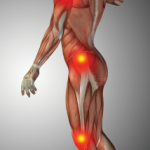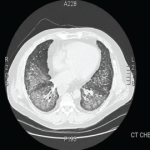NEW YORK (Reuters Health)—Treatment of uveitis with adalimumab is linked with “clinically meaningful” differences in quality of life compared with treatment with placebo, new research shows. Dr. John Sheppard of Eastern Virginia Medical School in Norfolk, Va., tells Reuters Health, “Regardless of underlying etiology or lack thereof, uveitis can have a profoundly adverse effect upon…

New Genetic Loci Identified, Epigenome Explored in Juvenile Idiopathic Arthritis
WASHINGTON, D.C.—Researchers have identified nine new genetic loci linked with juvenile idiopathic arthritis (JIA), along with evidence that at least some of them likely play a functional role, such as cytokine signaling and T cell expression. The findings were presented in an abstract session at the 2016 ACR/ARHP Annual Meeting, which also included a presentation…

Fellows Forum Case Report: Neuromyelitis Optica
Case Presentation The patient was a 42-year-old African American female diagnosed with systemic lupus erythematosus (SLE) based on the findings of polyarthritis, malar and discoid rash, fatigue, positive double-stranded DNA (dsDNA) ribonucleoprotein and Smith antibodies, and low serum complement levels. Her SLE had been well controlled on hydroxychloroquine 400 mg daily, oral methotrexate 25 mg…
Dermatology Consults May Cut Hospital Stays, Readmissions
NEW YORK (Reuters Health)—Inpatient dermatology consultations were associated with shorter hospital stays and reduced readmissions in a U.S. medical center and may do the same elsewhere, researchers in Ohio suggest. “A few decades ago, patients with severe psoriasis, drug reactions, blistering diseases and even severe eczema would be admitted to the hospital under close dermatology…

Clinical Trial Data Provides Insight into Muscle Biology, Myositis, Myopathies
WASHINGTON, D.C.—Ongoing investigation into the disease mechanisms of inflammatory myopathies is generating needed information for the development of potential future therapeutic targets, and current data from clinical trials have shed light on myopathy concerns in different cohorts of patients. These issues were all discussed in a session titled Muscle Biology, Myositis, and Myopathies I during…

Metagenomic Deep Sequencing for Uveitis Enhances Traditional Diagnostic Testing
Throughout their training and practice, physicians become adept at pattern recognition as a means to efficiently connect and synthesize seemingly disparate laboratory, physical exam, and radiologic and historical findings into a coherent theory for what likely ails the patient sitting in front of them. This inductive method of reasoning is necessary because, based on these…

How to Diagnose Antisynthetase Syndrome
Antisynthetase syndrome (AS) is strongly associated with the presence of antibodies to aminoacyl-transfer RNA (tRNA) synthetases (ARSs) that are implicated in the pathogenesis of myositis and interstitial lung disease (ILD). Antibodies against eight antisynthetases have been identified and are detected in 16–26% of patients with idiopathic inflammatory myopathies (IIM).1 Serum assays for five of these…
Volatility of the Gut Microbiome Tied to IBD
NEW YORK (Reuters Health)—Fluctuations in the gut microbiome over time could underlie inflammatory bowel disease (IBD), including Crohn’s and ulcerative colitis, researchers suggest. “Both the state and the dynamics of the human gut microbiome in healthy individuals are highly personalized. Although cross-sectional studies have revealed dysbiosis of the gut microbiome in IBD, little is known…

Anti-Interleukin-6 Therapy for Erdheim-Chester Disease Warrants Study
Erdheim-Chester disease (ECD) is a rare, non-Langerhan’s cell histiocytosis characterized by tissue infiltration of CD68-positive and CD1a-negative foamy histiocytes.1 ECD was discovered as a lipid granulomatosis in 1930 by Jakob Erdheim and his pupil, William Chester, and approximately 500 cases have been described to date.1 ECD has a heterogeneous course and prognosis ranging from an…

Pulse Therapy & Lupus Nephritis: A 40-Year History, 1976–2016
Corticosteroids still represent the mainstay of treatment of patients with active disease. They have been used for more than 60 years, and although prolonged use is associated with organ damage, they have been shown to be lifesaving in various phases of the history of the disease. History of Use First introduced in the late 1960s…
- « Previous Page
- 1
- …
- 18
- 19
- 20
- 21
- 22
- …
- 37
- Next Page »